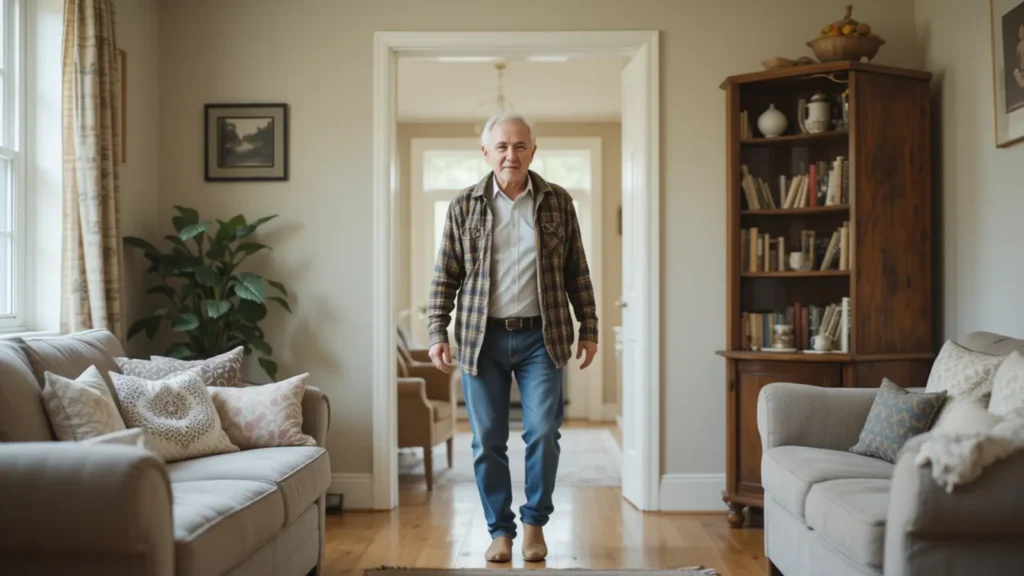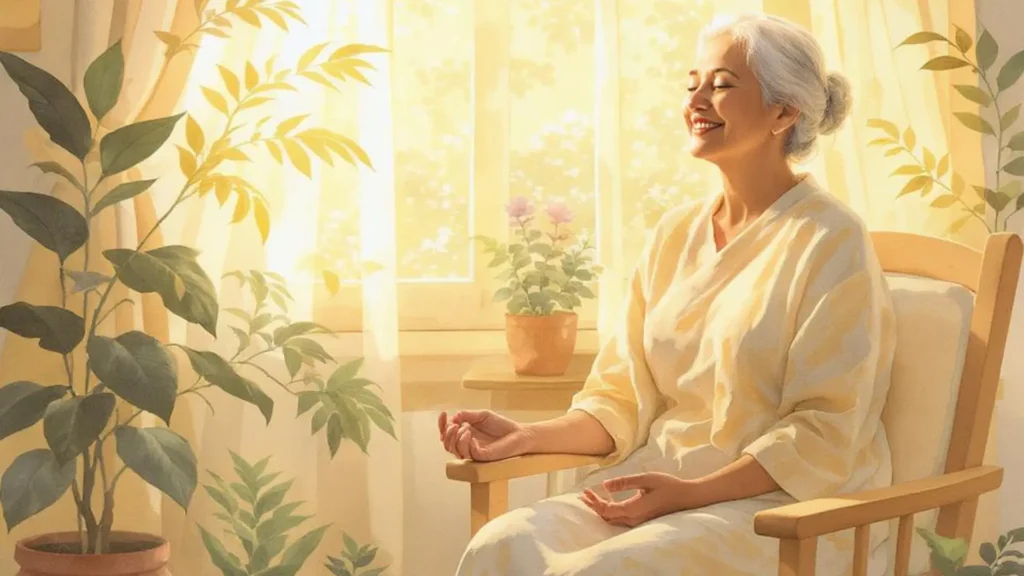You wake up and something feels off. Not pain. Not sickness. Just something missing. That quiet loneliness can eat away at how you think, feel, and sleep.
Many older adults feel this way—but stay silent. Some try to push through. Others don’t know where to turn. Here’s the question you need answered: Is it better to talk to a trained therapist or to spend time with people you trust?
This article will help you figure that out. You’ll learn what works, what doesn’t, and what truly makes your mind stronger.
As people age, their support systems shrink. Friends pass away. Children move out. Health changes your daily rhythm. These losses add up and hit your mood hard.
Your mental health affects your energy, your sleep, your memory, your drive to move, and how you talk to others. It’s not just about “feeling good.” It’s about how you live each day.
Therapy and social groups both claim to help. But they do different things. And not everyone needs the same help.
So how do you decide?
What Happens in Therapy?
Therapy is not small talk. It’s focused help. A licensed professional guides the conversation so you don’t get lost in your thoughts. You talk, but they help you see what’s under the surface.
You don’t need to “have a breakdown” to go. Many people start therapy because they feel numb. Or tired all the time. Or unsure about why they feel off. That’s enough of a reason.
You can talk about things you’ve held in for years. Things from your childhood. Things that happened when you lost someone. Or how aging has changed how you feel about life. You don’t need to explain everything perfectly. A good therapist knows how to follow your words.
You may feel nervous at first. That’s normal. But after a few visits, something clicks. You start hearing your own thoughts more clearly. That’s when change starts.
Therapists don’t tell you what to do. They don’t give advice like a friend might. They help you understand how your thoughts and emotions connect. They help you notice habits that might be hurting you.
They also teach skills—how to calm your mind, how to set limits, how to deal with fear without shutting down. They don’t fix you. They give you tools so you can feel strong again.
Some people go every week. Some go twice a month. Others check in once every few months. The right pace depends on how you feel and what you need.
Therapy doesn’t always mean years of work. Sometimes, a few months can make a real difference. But there’s no rush. You move at your own pace. It’s your space, your time, your story.
Now let’s talk about results.
Therapy lowers stress in your body. That means lower blood pressure, better sleep, and less muscle tension. It helps you focus better. It can reduce the heavy thoughts that stay with you all day. You may notice fewer outbursts, less worry, and more control over how you respond to people.
Therapy also helps you handle change. Aging brings big shifts—retirement, illness, loss of independence, grief. You can’t stop those things, but you can learn how to face them without breaking down.
Some therapists work in clinics. Some work in senior centers. Some talk on the phone or over video. You don’t have to leave home to get help. That’s a huge relief for people with health or travel limits.
Now, here’s the hard part.
Therapy isn’t always covered by insurance. And not every therapist is trained to work with older adults. Some don’t understand aging well. Some talk too fast. Some miss the mark.
That’s why it matters to find the right fit. If you don’t feel safe or understood, it’s okay to switch. You’re allowed to find someone better.
You also don’t need to figure this out alone. Ask your doctor. Call your local senior center. Look up mental health resources near you. Many cities offer free or low-cost services for older adults.
Still wondering if therapy is worth it?
Here’s the bottom line: If you feel stuck, if nothing feels enjoyable, if you carry old pain that never went away—therapy gives you a safe place to put it down. You can finally breathe again.
That’s not weakness. That’s healing.
Let me know if you’d like this expanded section formatted as bullet points, or if you’d like additional examples of what older adults say therapy helped them with.
What Happens in a Social Circle?
A social circle is simple, but powerful. It means people who notice when you’re gone. People who smile when they see you. People who ask, “How have you been?”—and mean it. That kind of attention keeps your mind and mood strong.
You don’t need a big crowd. Two or three real connections can make a big difference. You might meet at a center. Or at church. Or in a book club, walking group, or hobby class. It’s not about the activity—it’s about the people.
When you’re part of a group, your days feel more structured. You have something to prepare for. Somewhere to go. Someone to meet. That sense of rhythm gives your brain a goal. And goals protect your thinking.
Every conversation you have keeps your mind sharp. You listen. You remember names. You share thoughts. You take turns. These tiny moments help you stay focused and connected to the present.
The brain works best with regular contact. Faces. Voices. Questions. Laughter. These are the fuel that keep your emotions steady. When you spend time with others, your body also gets a boost—your heart rate evens out, your stress drops, and your body stays active longer.
But not every group is helpful.
If the people in the group are cold, rude, or fake—it drains you. If people only talk about others, not with others—it shuts you down. If you feel judged, or unseen, or too different—that’s not connection. That’s noise.
Real social health comes from kindness. From listening. From trust. And from being accepted, not fixed.
Good groups reduce depression. They help people live longer. They improve memory. They even lower the chance of physical disability. All of that from human contact. No pills. No side effects.
But there are limits.
Social groups can’t go deep into trauma. They’re not built for that. If you’ve lost someone and can’t move forward—group time won’t always help. If you feel fear or guilt that won’t go away, chatting over tea may not be enough.
Also, if you’ve been alone for a long time, joining a group may feel too big. That’s a real barrier. You may worry about not fitting in. You may feel behind or unsure what to say. These feelings are common.
Still, there’s a way in. You can start with something small. Sit in on a group without talking. Attend once a week. Let one person learn your name. You don’t have to “be social.” You just have to show up.
And once that small step becomes part of your week, it grows. You feel lighter. You feel heard. You feel human again.
That’s when things start to change.
Let me know if you’d like me to add sample groups, conversation starters, or ways to build new circles step by step.
The Truth Few Talk About: You May Need Both
This isn’t a battle. It’s not “either-or.”
Therapy helps when your thoughts feel stuck. When old pain won’t go away. When you feel lost and no one else seems to understand.
Social circles help when you feel disconnected. When you stay quiet for too long. When your days feel too slow or too empty.
But the best mental health comes from combining both.
You talk through deep issues with someone trained. Then, you take those gains and live them out with others. Therapy heals the roots. Connection builds the branches.
Here’s a pattern interruption: Many older adults think they have to pick one. Or that it’s too late for either. That’s false.
Some therapists now do phone sessions. Some group meetups start with just one coffee or call. Starting is small. Staying is where the magic happens.
There’s another twist. Some social groups bring in mental health speakers. Some therapists teach group skills. The lines blur—and that’s a good thing.
This balance builds stronger habits, deeper sleep, more stable mood, and longer focus. You don’t need to solve this alone.
How to choose what’s right for you, let’s make it simple.
You may need therapy first if:
- You feel hopeless or anxious every day.
- You avoid people.
- You can’t shake a past event.
- You’re not sleeping well.
- You don’t feel safe being honest in groups.
You may need social circles first if:
- You feel bored, not sad.
- You want to laugh more.
- You want a reason to get out of the house.
- You miss conversation.
- You feel fine but stuck in the same routine.
And you may need both if:
- You have both sadness and loneliness.
- You struggle with grief but still want to connect.
- You want to get better at expressing yourself in group settings.
- You want change to last.
Starting is easier than you think.
Therapy can begin with a phone call. Ask your doctor. Ask a senior center. Look up free mental health hotlines.
Social connection can begin by joining one club, class, or walking group. You don’t need ten people. You just need one.
Here’s something people miss: doing one step helps the other. Talking to a therapist may make you more open to groups. Joining a group may help you open up to therapy.
That’s how change stacks up. One thing leads to another. That’s real mental health. Your brain matters as much as your body. It’s not weak to want help. It’s wise.
Therapy is not for the broken. Social groups are not just for the outgoing. Both are tools. You use them to build a stronger mind.
Ask yourself: What do I want my days to feel like? If your answer is “clear,” “steady,” “connected,” or “alive”—then start today. You don’t have to be ready. You just have to be curious.
Take one small step toward feeling better. Talk to someone. Join something. Heal something. You are allowed to feel good again. And you are not alone.




